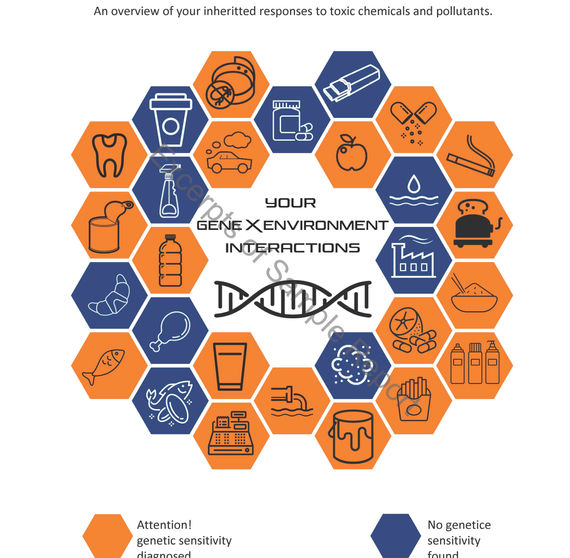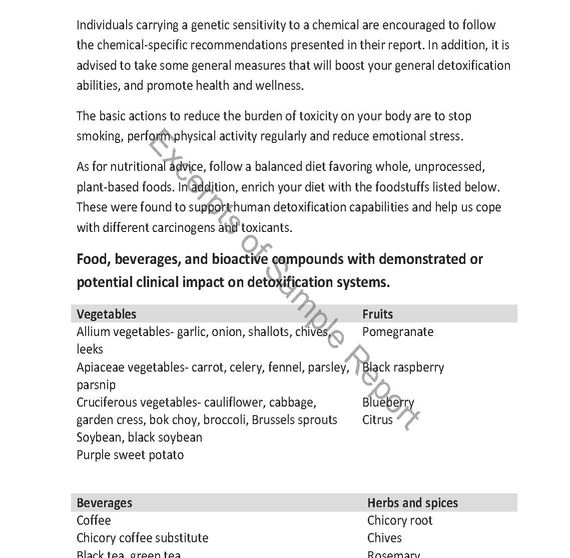
"Keep your body clean of toxic chemicals. It is as important to your health as diet or exercise"
Prevent Disease, Promote Wellness, Slow-down Aging

OUR WORLD IS POLLUTED
Hormone-disruptors, carcinogens and immune depressants are serious body-burdens.
PEOPLE ARE ESPECIALLY SENSITIVE TO SOME CHEMICALS
We differ in our detoxification abilities, on a genetic basis.
YOUR DNA CAN TELL
Uncover your own response to different toxins and chemicals- and get proactive.

Your genetic analysis can unravel how well your own body copes with carcinogens, pollutants and other toxic chemicals such as...
▪ Lead toxic metal found in old houses, water pipes, playgrounds, jewelry
▪ PAH, HCA carcinogens in meat, smog, cigarette smoke
▪ Benzene toxic gas in traffic exhaust, factory emissions, solvents
▪ Bisphenol-A endocrine disruptor in food containers, toys, cans
▪ Phthalates pollutants found in cosmetics, chewing gum, toys
▪ Arsenic contaminating water and abundant in rice
▪ Dioxin ubiquitous pollutant in dairy products and meat
▪ Acrylamide hazardous substance in pastries, fast food, french fries, coffee
▪ Mercury toxic heavy metal found in fish, cosmetics, dental fillings
▪ Pesticides and herbicides chemicals applied on produce and the environment
and additional chemicals.
Pesticides
Our body is constantly busy with detoxifying and excreting the cocktail of pesticides, herbicides and fungicides found in our food.
Pesticides are linked with disorders such as cancer, Alzheimer’s disease, developmental disorders, asthma and more.
Some people are born with a reduced ability to cope with pesticides, while others enjoy a genetic makeup that encodes for faster secretion and better detoxification rates.

Meat Carcinogens
Genetic sensitivity puts 1 in 10 Americans at greater risk for colon cancer.
Eating cooked meat exposes your body to HCAs and PAHs- two carcinogens. These chemicals significantly increase the risk for colon cancer if not eliminated quickly by your anti-oxidative enzymes.
The low-activity version of the enzyme makes some of us extra-sensitive to the carcinogens in meat, and in smoke. However, it is possible to increase the enzyme's activity and lower the risk for carriers of this genetic variation.

Mercury
Mercury is a poisonous heavy-metal. It is considered as a global pollutant and a well-known neuro-toxin.
Chronic human exposure may occur through some industrial processes, occupational and household uses, dental amalgams, mercury-containing vaccines, and consumption of contaminated fish and seafood.
New scientific evidence shows that susceptibility genes can make certain individuals more vulnerable to mercury toxicity.

Benzene
Benzene is strongly associated with blood and immune system disorders, including anemia, leukemia and lymphoma.
Benzene is a toxic component of gasoline but also heavily manufactured in the US as a starting material for many chemicals.
Common genetic variations in metabolic genes can alter the individual response to benzene.
Learn whether you are extra sensitive to benzene, and what you can do about it.

Dioxin
Dioxins are Persistent Environmental Pollutants that bio-accumulate in the food chain and found mainly in meat, fish and dairy products.
Once dioxins enter the body, they are absorbed in the fatty tissues and stored for years before they can be broken down.
Dioxins are highly toxic and can cause reproductive and developmental problems, damage the immune system, interfere with hormones and cause cancer.
Individuals with a genetic sensitivity to dioxin can take several measures to reduce the burden of dioxins on their body.

BPA
BPA structure is similar to estrogen, allowing it to disrupt endocrine and reproductive functions in males and females.
Bisphenol-A (BPA) is found in many plastic items and readily leaches into our food and water.
Exposure to BPA is associated with increased incidence of breast cancer, altered immune function and abnormal growth and developmental delays in children.
Individual variations in genes that encode for enzymes who excrete BPA determine how susceptible people are to the adverse effects of this chemical.

Arsenic
Approximately 13 million Americans are exposed to arsenic through drinking water alone, while many others are exposed through their diet.
Arsenic is a highly toxic element and classified as a known human carcinogen.
Certain genetic makeups are associated with metabolism, secretion and levels of arsenic in body tissues, making some people more sensitive to its deleterious effects.

Phthalates
Exposure to phthalate is associated with asthma and allergies, obesity and cancer.
Phthalates are man-made plasticizers widely used in flexible vinyl products (flooring, wall coverings, toys, food containers and medical supplies), in personal care products (nail polish, deodorants, shampoos, conditioners and perfumes) and in solvents.
Phthalates are also added by the food industry to replace expensive natural emulsifiers.

Perchlorate
The Environmental Protection Agency (EPA) has declared that “perchlorate is known to occur in public drinking water systems with a frequency and at levels that present a public health concern".
Sources of water contamination include manufacture of propellants, explosives and batteries. Perchlorate-like chemicals are widely applied as herbicides, fertilizers and soil sterilants, leaching into drinking water or directly into crops.
Perchlorate interferes with the ability to absorb iodine into the thyroid gland. Carriers of a certain genetic makeup are more likely to develop hypothyroidism as a result of perchlorate exposure.

Acrylamide
High Acrylamide levels are generated in the production of snack foods, potato crisps, cereal products, coffee and tobacco smoke. Acrylamide is directly used in manufacturing creams, body lotions, shampoos.
Acrylamide induces damage to DNA and promotes cancer, and a known neuro-toxin as well.

SAMPLE REPORT



















